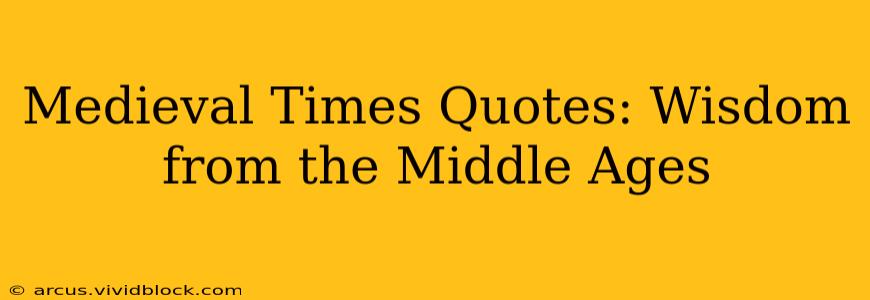The Middle Ages, a period spanning from the 5th to the 15th century, often conjures images of knights, castles, and epic battles. However, this era also produced a wealth of insightful quotes that resonate even today. These weren't just pronouncements from kings and queens; they reflected the philosophical, religious, and social landscapes of the time, offering timeless wisdom on love, life, and the human condition. This exploration delves into some of the most memorable quotes from Medieval times, examining their context and enduring relevance.
What are some famous Medieval quotes?
This is a broad question, as "famous" can be subjective. However, some quotes stand out due to their frequent citation, their impact on subsequent thought, or their enduring philosophical value. Many are attributed to specific individuals, while others are anonymously passed down through the ages. We’ll explore a range of examples, showcasing the diversity of voices from the Medieval period.
What are some quotes about love from the Medieval period?
Medieval literature is replete with romantic narratives and poetry, often exploring the complexities of courtly love. While idealized and sometimes unattainable, these expressions of affection offer valuable insight into the societal views of love at the time. Unfortunately, pinning down specific attributable quotes solely focused on love and definitively originating from the Medieval period is challenging. Much of the romantic sentiment is woven into longer works like poems and romances, making direct quotation difficult. However, the overarching themes of devotion, longing, and the struggle between earthly and spiritual love are consistently present.
What are some quotes about life and death from the Medieval period?
The pervasive influence of the Church during the Middle Ages heavily shaped perspectives on life and death. The inevitability of death, the concept of the afterlife, and the importance of faith in navigating mortality were central themes. Again, direct attribution to specific individuals for concise quotes on these subjects is difficult, as the ideas are often found embedded within larger theological works or sermons. The Danse Macabre, a popular artistic and literary motif depicting the universality of death, offers a visual representation of these prevailing ideas.
What are some inspiring quotes from Medieval times?
Inspiration in the Medieval period frequently stemmed from religious faith, chivalry, and the pursuit of knowledge. While direct attribution is problematic, the spirit of these values is captured in many medieval texts. Stories of saints, tales of heroic knights, and the pursuit of learning, all contributed to an ethos of striving for something greater than oneself. This inspirational spirit is often subtly woven into larger narrative structures, rather than being expressed in easily isolatable quotes.
What were the main themes in Medieval literature?
Medieval literature encompassed a broad range of themes, including:
- Religion: The dominant influence of Christianity is evident throughout the literature, exploring theological concepts, the lives of saints, and the nature of faith.
- Chivalry: The ideal of the knight – courage, honor, and loyalty – is a recurring motif in narratives.
- Courtly Love: This idealized and often unattainable form of love is explored in poetry and romance.
- Allegory: Many works use symbolic narratives to convey moral or spiritual lessons.
- Social Commentary: Some works offer glimpses into the social structures, inequalities, and challenges of the time.
Conclusion
While definitively attributing concise, famous quotes to specific individuals from the Medieval period proves difficult, the era's rich literary and philosophical landscape offers a wealth of wisdom. The overarching themes—love, loss, faith, courage, and the human condition—remain deeply resonant. Exploring the works of the period offers a window into the values, beliefs, and experiences of people who lived centuries ago, allowing us to glean timeless wisdom from their stories and reflect on their enduring relevance in our modern world. Further research into specific authors and texts from this era, such as Chaucer, Dante, and the various illuminated manuscripts, will reveal the depth and breadth of the medieval perspective.

